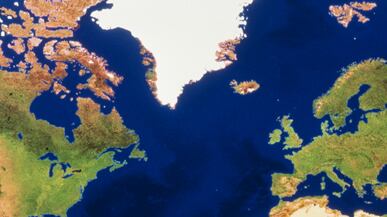When I was a child in England before the war, Christmas pudding always contained at least one shiny new sixpence, and it was considered a sign of great good luck for the new year to find one in your helping of the pudding. Actually, since I always found a sixpence in mine, I suspect that Nanny Low and cook “salted” the pudding with sixpences, so I couldn’t not find one in my helping, but never mind, certain books remind me of that pudding, rich, full of delicious bits and pieces—currants, raisins, candied lemon peel, and so on—and containing hidden treasures. Simon Winchester’s Atlantic is just such a pudding of a book, and like a pudding it needs to be devoured a bit at a time, both to make it last longer and because there is a lot to taste. It is 495 pages long, but it could have been twice as long, and I would still be standing there, bowl in hand, saying, “Please, sir, can I have some more?”

However riotous British students may now be, Winchester is a perfect example of the value of a British education. A fellow Oxonian, he is learned, witty, his head stuffed to bursting with facts and curious lore, nothing fazes him, not storms, literary criticism, landscapes, seascapes, science or poetry, he can deal with it all, il est bon a tout faire; he is also physically adventurous, clearly no mere bookworm or armchair traveler, and a curious and a keen observer of things and people, albeit with a certain very English detachment, rather like that quality which made the travel books of so many other Oxonians—Graham Greene and Evelyn Waugh come to mind—so very readable. T. E. Lawrence, another Oxonian traveler, would have loved Atlantic, which is at once satisfying, suspenseful (no mean trick on the subject of an ocean), thought-provoking, occasionally funny, and always absorbing.
So big a subject as the Atlantic Ocean requires a certain largeness of spirit, and amplitude of descriptive power, and Simon Winchester is gloriously up to the task. I haven’t read a better book about the sea and those who sail on it (and its effect on the history of great powers) since Garrett Mattingly’s The Armada, of which one critic wrote that “it is written in purple prose but a royal purple,” something which might be said of Winchester as well. That should not be taken as criticism—just as there is no such thing as too much caviar, the age, the breadth, the majesty, the vast role it has played in human affairs all combine to make the Atlantic Ocean a subject that calls for the approach of Turner, not some namby-pamby, line-drawing minimalist, and despite his amazing erudition Winchester knows how to pull out all the stops, and give us the vox humana. His descriptions of the ocean are thrilling, as are those of the people who have sailed on it over the centuries, always in search of something they could not find at home.
I was hooked (the right word about a book in which fishes play a major role) from page one when he began by mentioning that he crossed the Atlantic for the first time in 1963 on board the Empress of Britain, of the Canadian Pacific line, since I made my first crossing in the winter of 1940 on board the same line’s Empress of Canada, painted war-time grey instead of white, and carrying 2,000 British children being evacuated to the safety of Canada and the United States, in accordance with some preposterous pre-war scheme of the Chamberlain government. I spent as much of my time as I could on deck, since I do not suffer at all from seasickness, whereas many of the children on board did, to a noisome degree, and I therefore had plenty of time to admire the great rolling waves, the occasional whales and the icebergs (nobody had told me about the Titanic, so they didn’t frighten me) in the hope of seeing a German submarine sunk by our escorts, and like Winchester developed early on a deep love of the ocean, and its many moods.
His book brought out in me, as it will in many readers, a deep well of nostalgia, and the recollection of many voyages in ships, freighters, troop transports, Channel ferries and yachts, as well as the sheer gratification that one man could know so much about so large an object. Of course Winchester is English: he has a certain contempt for the Pacific Ocean, and dismisses “the wine-dark” Mediterranean as altogether too small and tame (although I have been in some spectacular storms there, and its hold on human history and the literary imagination is of far longer standing than the Atlantic’s), but then with oceans as with women, to each man his own taste.
Winchester has arranged his book of the Atlantic in seven sections to match and reflect the seven ages of man from the “All the world’s a stage. . .” speech in As You Like It, perhaps because you can’t write about something this big and old without a plan or a formula of some kind to break it down into manageable pieces, but luckily this conceit is neither obtrusive, nor binding, indeed if he hadn’t warned the reader about this plan in his preface, I might not have noticed it. In fact, I felt the book had a certain tidal ebb and flow, alternating between the ocean’s majestic and sometimes geological growth, the lives of those who sailed over it in humankind’s much shorter history, the creatures that live in it and the poetry that has been written about it, with a rhythm of its own that seems to have nothing to do with his plan.
He begins fascinatingly with the natural history of the Atlantic, reminding the reader that despite its size the ocean has a lifespan, a beginning, a middle and an end, that it was born some 250 million years ago in a long period of volcanic eruption preceding which there had been a single land mass and a single, surrounding sea, that it reached approximately its present shape some 10 million years ago, that it is now in its maturity, but constantly changing, and one day will die (about 170 million years from now, Winchester predicts), in any case so far in the future that humankind will no longer be around to observe its passing, in short that the Atlantic is a living thing, something to reflect upon when considering how much damage we have succeeded in doing to it since the birth of the Industrial Revolution. Winchester is superb at this long view of the Atlantic—it is not for nothing that he wrote a splendid book about the volcanic explosion of Krakatoa—and manages to make geology and the formation of oceans and continents a fascinating saga. He moves on to those who first set sail on this enormous and stormy sea—his description of the Phoenicians venturing out onto it in search of tin and the snail from which a purple dye could be produced that was more valuable than gold in the ancient world is great stuff, a heady mixture of history, science and adventure—and from there to the Norsemen, the Vikings and the first explorers who made the extraordinary deduction (soon confirmed by bold journeys of discovery) that far from being, as it appeared, an endless expanse of water, there were two sides to the Atlantic, and all of known human history had so far taken place on only one. He moves on from there to the first oceanographers, who set out to chart and describe this vast object, and the sailors, kings and merchants who boldly began the trade across the Atlantic that would eventually make it the most traveled and fought over of oceans, and would for a time make Europe the richest of civilizations. Colonialization, the history of the slave trade, piracy (on the subject of which Winchester is blood-curdling), whaling, you name it, he describes all these things and much more brilliantly, he is even fascinating on the subject of St. Helena, the remote island to which Napoleon was finally exiled (Who knew St. Helena is that interesting?), as well as the difference between the British and American views of the Atlantic Ocean, about which he has original and thought-provoking opinions, since he is one of those rare writers who is as good at breathtakingly large-scale generalizations as he is about details.

He dwells on the effect of the Atlantic on literature and art, on the undersea geography of the Atlantic’s ocean bed, and much, much else, yet still manages to keep the narrative rolling, never bogging down in details. In part this is because the real spine of Winchester’s book is not “the seven ages of man” at all, but his own life as an adventurous traveler, who has seen whereof he writes, and lists his travels to “Morocco, Brazil, Argentina, Newfoundland, Monte Carlo, Namibia and Norway, as well as to such islands as St. Helena, Greenland, Tristan de Cunha, Bermuda, Muckle Flugga, and a score of others. . .” Part of the charm of the book lies precisely in Winchester’s wanderlust and curiosity, he is one of those Englishman whose passion is to see with his own eyes all the faraway things that the rest of us are content to read about.
For those of a certain age, the front endpaper, a photograph of well-dressed people watching a trio of great liners being berthed at their dock in the Hudson, I would guess in the '30s, says it all: the Atlantic is now a place that we fly over on the way to our destination, a flat, grey expanse of water we see from the window of our aircraft (if we have a window seat), and no longer the fierce and unpredictable obstacle that has to be crossed by ship over stormy and sometimes treacherous seas, giving everybody a chance to experience its awesome power, which was more than capable of making even the greatest of ocean liners, like the old Queen Elizabeth and the Queen Mary, shake, rattle and roll as the mighty waves broke over their bows and kept all but the heartiest of passengers groaning in their berth. Perhaps in revenge, the great storms the Atlantic now sends us are bigger than ever, while the melting of the polar ice-cap threatens to engulf one day many of our largest cities. The Atlantic does not like to be ignored, taken for granted, or fished out and polluted—for Winchester has not only described the indescribable, but has managed to make it a living person, with a character of its own: a brilliant and richly satisfying achievement.
[F]or Winchester has not only described the indescribable, but has managed to make it a living person, with a character of its own: a brilliant and richly satisfying achievement.
I hope his book will be under many a tree this Christmas. I can’t imagine a nicer present.
Plus: Check out Book Beast, for more news on hot titles and authors and excerpts from the latest books.
New York Times bestselling author Michael Korda's books include Ike, Horse People, Country Matters, Ulysses S. Grant, and Charmed Lives.






